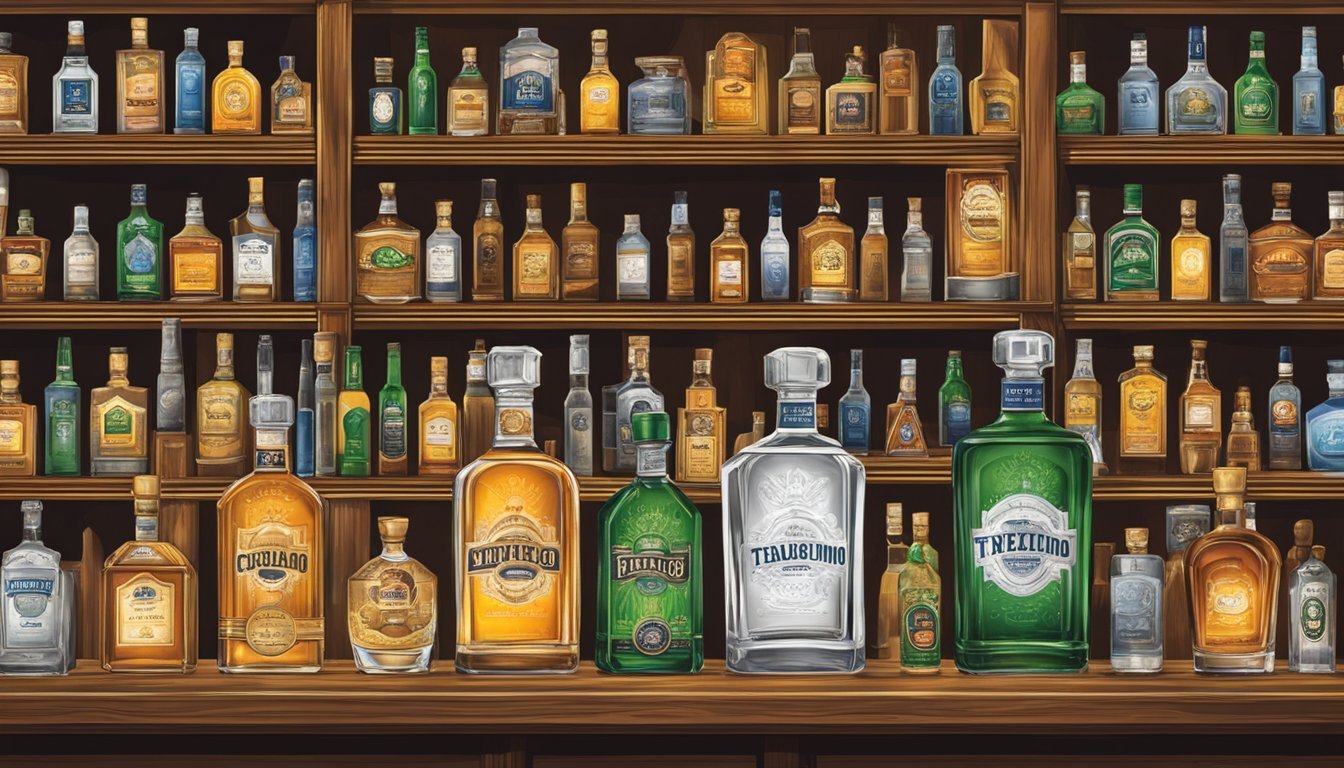The Rise of Cristalino Tequila in Texas Bars
A Clear Trend Setting
Cristalino tequila, though not officially recognized as a separate category by the Tequila Regulatory Council, has been gaining attention for its unique properties and the meticulous process it undergoes. Typically aged in oak barrels like its añejo and extra añejo counterparts, cristalino is carefully filtered to remove its color, resulting in a clear, refined spirit that retains the complex flavors developed during maturation. This innovative twist on traditional tequila offers a smoother and more approachable tasting experience.
In Texas bars, the ascent of cristalino tequila signifies a shift towards more premium and artisanal offerings within the tequila category. Bartenders across the Lone Star State are increasingly showcasing cristalino tequilas as their go-to choice for both sipping neat and mixing into sophisticated cocktails. This pivot caters to a clientele that seeks the rich flavors inherent in aged tequilas, paired with the crisp, clean profile that cristalino provides. As interest in premium spirits continues to rise across the state, cristalino is becoming more popular, finding its place on the top shelves of bars throughout Texas.
Historical Context of Tequila
The historical backdrop of tequila is deeply interwoven with Mexican tradition and culture while evolving to embrace modernity, which has led to innovative creations like Cristalino tequila.
Evolution from Traditional to Modern Tequila
Tequila's transformation from traditional distillation methods to modern trends encapsulates centuries of heritage. Made from the agave plant primarily in the region of Jalisco, Mexico, traditional tequila is a Mexican spirit that has adhered to strict standards set by the Tequila Regulatory Council. Rooted in rich customs, tequila production originally revolved around farming and fermenting blue agave, with the first officially recognized distillery opening in the 1600s.
Rise of Cristalino Tequila
The arrival of Cristalino tequila is a testament to the spirit's innovative journey. This relatively new variant is an aged clear tequila, achieving its transparency through charcoal filtration while striving to maintain the flavors and aromas developed during barrel aging. Its emergence reflects a delicate balance of preserving the aged characteristics of traditional tequila while appealing to modern palates.
Tequila in American Culture
Tequila's integration into American culture began subtly but has steadily risen to prominence in bars and homes. Pioneering importers in the 1980s introduced the U.S. to superior, 100% agave tequilas. Over time, this laid the groundwork for the spirit's increased demand and cultural significance in the country, with Texas bars now showcasing tequila's versatility from classic margaritas to sophisticated Cristalino-influenced cocktails.
Understanding Cristalino Tequila
Cristalino Tequila is emerging as an innovative spirit that combines the rich flavors of aged tequilas with a clear, refined appearance. It is becoming a staple in Texas bars due to its unique production process and the balanced flavor profile that it offers.
Characteristics of Cristalino
Cristalino Tequila is a type of aged tequila that has undergone a filtration process to remove its color while aiming to keep the complex flavors and aromas intact. The outcome is a spirit that appears clear and maintains the sophisticated taste of an aged tequila, often bearing the following traits:
Clarity: Transparent appearance, resembling a blanco or silver tequila.
Flavor Profile: Retains the agave flavor and notes typical of añejo and reposado tequilas.
Aroma: Can include a range of scents from mellow wood and nuts to fruits, without the overt presence of charcoal.
Production Process
The production of Cristalino Tequila involves traditional aging followed by a modern twist: the filtration process. This process typically incorporates activated charcoal, which is instrumental in stripping the color from the tequila without stripping away the aged flavors. Detailed steps include:
Aging: The tequila is aged in barrels, as is standard for añejo or reposado varieties.
Filtration: After aging, the tequila is filtered through activated carbon or charcoal to remove color.
Blending: Some producers may blend the filtered tequila with other aged tequilas to achieve a desired flavor profile.
Añejo vs Cristalino: A Comparative Analysis
Comparing añejo and cristalino tequilas, several key differences and similarities arise:
Color: Añejo maintains a dark hue from the aging process, while cristalino is filtered clear.
Flavor Components: Both share flavor notes derived from aging, including agave flavor, with cristalino potentially having a more mellow profile.
Añejo Tequila Cristalino Tequila
Color Amber to deep gold Clear
Aging Minimum of 1 year Follows añejo or reposado aging, then filtered
Flavor Rich, complex agave and wood notes Preserves aged flavors, mellow and smooth
Through the use of activated charcoal in the filtration process, cristalino tequila producers are able to offer an aged spirit that is both sophisticated in flavor and modern in appearance, thereby meeting the demand for innovative spirits among consumers.
Cristalino Tequila in Texas Bars
The introduction of Cristalino Tequila in Texas bars has revolutionized the local spirits landscape with its unique characteristics and versatility in serving styles, thereby influencing the drinking culture in the region.
Popularity and Demand
Cristalino Tequila has rapidly gained popularity among Texas bar patrons due to its refined taste and premium quality. Texas bars are seeing a significant rise in customer requests for Cristalino Tequila, often favored for its clear appearance and sophisticated flavor profile that bridges the gap between traditional aged tequilas and the lighter blanco variants. The demand is particularly strong in upscale establishments where clientele have a penchant for premium spirits.
Serving Styles
In Texas bars, Cristalino Tequila is typically offered in a variety of serving styles to cater to diverse patron preferences:
Neat: For those who appreciate the pure expression of the spirit's flavor.
On the Rocks: Served over ice to subtly mellow the taste.
Cocktails: Incorporated into innovative mixed drinks that showcase Cristalino's versatility.
Shot: Offered as a straight shot, sometimes accompanied by a side of sangrita.
Each serving style allows the distinct characteristics of Cristalino Tequila to be experienced differently, providing an accessible option for both tequila connoisseurs and newcomers alike.
Influence on Local Drinking Culture
Cristalino Tequila's presence in Texas bars has altered the landscape of local drinking culture, positioning tequila alongside other high-end spirits typically favored by the discerning Texan drinker. It has challenged traditional perceptions of tequila, demonstrating that it can be both a sophisticated sipping spirit and a versatile cocktail ingredient. This shift is gradually fostering a more nuanced appreciation of tequila within Texas bar culture.
Cristalino Varieties and Brands
Cristalino tequila has become a staple in Texas bars, with its clear appearance and aged flavors. This section explores some of the foremost Cristalino offerings found in Texas, the innovation behind their production, and how they compare to other agave spirits.
Top Cristalino Offerings in Texas
In Texas, patrons are increasingly drawn to the premium selections of Cristalino tequilas. Don Julio 70 stands out with its nuanced flavors, known as the first Añejo Claro tequila, a class defined by its clear color yet aged complexity. Maestro Dobel Diamante, another notable Cristalino, merges the qualities of Reposado, Añejo, and Extra-Añejo tequilas through a proprietary blending and filtration process. Additionally, the Avión Reserva Cristalino is a popular choice, offering a blend of 12-month-old añejo and three-year-old extra-añejo that has undergone a double-charcoal filtration process.
Innovations in Aging and Blending
The craft of Cristalino tequila production is characterized by its innovative aging and blending techniques. Maestro Dobel 50, celebrating the company's 50th anniversary, exemplifies this through its Extra-Añejo tequila that is then clarified, maintaining the robust flavors imbued by the aging process. Reposado Cristalino varieties add another dimension, aging for a shorter period like a traditional Reposado but then undergoing filtration to strike a balance between clear presentation and maintained barrel-aged notes.
Comparing Cristalino to Other Agave Spirits
Cristalino tequila distinguishes itself from other agave spirits like traditional Blanco or unaged tequilas by offering a smooth sip with the complexity of an aged spirit. In contrast to the bold and earthy flavors often found in aged tequila varieties like Reposado or Extra Añejo, Cristalino's filtration technique delivers a product that retains depth while presenting a softer profile. The nuanced caramel, vanilla, and butterscotch flavors evident in these offerings bridge the gap between the bright, fresh qualities of a Blanco and the rich warmth of an aged tequila.
Cristalino Flavors and Aromas
The nuanced flavors and aromas of Cristalino Tequila offer a sophisticated experience that has become a hallmark in Texas bars.
The Complex Profile of Cristalino
The exceptional characteristic of Cristalino Tequila lies in its successful retention of complex flavors despite undergoing charcoal filtration. This process strips away the color acquired from barrel aging but carefully preserves the intricate profile. Cristalino typically features rich notes of:
Vanilla: Delicate, often with a smooth heritage from barrel aging.
Agave: The heart of tequila, offering a sweet and earthy baseline.
Alongside these flavors, one can often detect subtle hints of:
Caramel: Adds a layer of sweetness and depth.
Chocolate: Sometimes present, lending a nuanced bitterness.
Aromas and Flavors Palette
Cristalino's aromas are just as distinct as its clear appearance, composed of a palette that includes:
Coconut: This tropical scent may waft through, a result of its aging process.
Citrus: Bright zests of lemon or lime add a fresh facet to the Cristalino profile.
Moreover, the aroma may be accented with:
Floral Characteristics: These can range from a hint of jasmine to a bouquet that invokes the Mexican countryside.
Mixology and Cristalino-Based Cocktails
Cristalino Tequila introduces a refined clarity to cocktails, enhancing traditional flavors with its unique blend and smoothness.
Classic Cocktails with a Cristalino Twist
Cristalino tequila revitalizes classic cocktails with its distinctive character. Mixologists now reimagine traditional favorites by incorporating this luxurious spirit. The clear hue and preserved aromas of aged tequila, thanks to the filtration process, enable a seamless integration into time-honored mixes like the Old Fashioned and Negroni. For instance:
Old Fashioned: Substitute bourbon with Cristalino to add a tequila sophistication.
Negroni: Replace gin with Cristalino for a smooth, agave-infused variant.
Crafting the Perfect Margarita and Paloma
Both the Margarita and the Paloma have found a new dimension with Cristalino Tequila. To craft the perfect Margarita:
Margarita:
Combine 2 oz Cristalino tequila with 1 oz freshly squeezed lime juice.
Add 1/2 oz orange liqueur and 1/2 oz agave syrup.
Shake with ice and strain into a salt-rimmed glass.
The Paloma, on the other hand, balances the nuanced flavor of Cristalino with the bright, refreshing notes of grapefruit, creating a harmonious blend:
Paloma:
Mix 2 oz Cristalino tequila with 6 oz fresh grapefruit soda.
Squeeze in the juice of 1/4 lime and stir.
Serve over ice in a highball glass with a salted rim.
Cristalino Pairings and Mixers
With Cristalino's unique profile, selecting the right pairings and mixers is key to accentuating its flavors. They should enhance without overshadowing the refined characteristics of Cristalino tequila. Complementary mixers include:
Tonic water: For a simple, crisp serving.
Agave nectar: Sweetens cocktails while staying true to the tequila roots.
Ideal pairings that resonate with Cristalino's smoothness and subtle sweetness might feature citrus or light fruit elements to uplift its natural aromas.
Consumer Perceptions and Market Trends
The emergence of Cristalino Tequila mirrors a broader shift in the palate of consumers, moving away from traditional offerings in favor of this innovative agave spirit. With clear market indicators, bars in Texas are noticing the trend as it unfolds in consumer preferences and its standing in the global market.
Shift in Consumer Preferences
Customers are increasingly opting for tequilas that offer a unique experience both in flavor and presentation, with Cristalino Tequila becoming a popular choice. Its smooth finish and crystal-clear appearance make it a standout in the crowded tequila category, often appealing to a market segment that values both sophistication and novelty in their beverages. Retailers are responding to this trend by allocating more shelf space to Cristalino Tequila, confirming its popularity and growth potential.
Cristalino's Position in the Global Market
As an agave spirit, Cristalino Tequila has begun carving out a significant niche for itself on the global stage. Market analyses identify Cristalino as a key driver in the expansion of the tequila category, thanks to its rapid volume growth. While it started from a smaller base compared to other tequila types, Cristalino's rise has been impressive, particularly in markets like the United States where its distinct character has earned it a place among the fastest-growing segments within the tequila category.
Comparative Analysis
In Texas bars, the emergence of Cristalino tequila is redefining the spirit's landscape. This section examines its rise in comparison with other popular spirits and assesses how global trends are reshaping local tastes.
Cristalino vs Other Spirits
Cristalino tequila distinguishes itself from other tequilas such as blancos by its unique filtration process. This process strips the spirit of its color while maintaining the complex flavors derived from barrel aging. The result is a clear tequila that competes in a market where clarity is often associated with purity, a niche traditionally dominated by spirits like vodka. Vodka has long been a staple in Texas bars, known for its neutral taste and versatility. However, Cristalino offers a more nuanced flavor profile, challenging vodka's position.
Comparatively, whiskey, notably Tennessee whiskey, has a deep connection to American culture and has been a fixture in Texas bars. While whiskey is celebrated for its rich, oaky notes from a lengthy aging process, Cristalino tequila presents a lighter alternative still rooted in a heritage of aging. It poses an upscale choice for patrons who seek a premium drinking experience without moving entirely away from aged spirits.
Spirit Type Main Characteristics Texas Bar Scene Role
Cristalino Aged, filtered, nuanced flavor Emerging premium choice
Blancos Unaged, clear, pure agave flavor Traditional, accessible offering
Vodka Neutral, versatile Established, mixed drink foundation
Whiskey Aged, rich flavor, cultural significance Time-honored, sipping staple
Global Influence on Local Preferences
Global trends are indisputably influencing local preferences in Texas bars. Eastern European vodka has long enjoyed international recognition, influencing global markets and consumer tastes. Texas bar patrons schooled in diverse spirits find Cristalino a familiar yet innovative option, merging clear-spirit appeal with tequila's heritage.
The worldwide expansion of tequila, particularly driven by 100% agave and Cristalino varieties, has seen these spirits finding a prominent place on Texas shelves. The cross-cultural influence has exposed local consumers to new experiences and tastes, elevating Cristalino's status as a spirit of choice and curiosity.
These trends suggest that Texas bars are not only reflecting but also contributing to the global narrative where variety and innovation are celebrated, and Cristalino tequila is at the forefront of this cultural shift.
The Future of Cristalino Tequila
Cristalino Tequila is poised for growth, capitalizing on its popularity and the industry's push for innovation and sustainable practices.
Emerging Trends and Predictions
The trajectory of Cristalino Tequila points toward continued expansion. Industry forecasts suggest a 55% increase in sales by 2026, signaling a burgeoning interest among consumers. The demand in Texas bars aligns with a broader market trend where a diverse range of producers, including brands like Avión and Volcan, are expanding their offerings of Cristalino. This reflects a shift in consumer preferences towards premium and ultra-premium spirits.
Innovation in the Tequila Industry
Innovation remains central to the essence of Cristalino Tequila. Producers strive to perfect the balance in the filtration process, ensuring the characteristic smoothness while retaining complex flavors from barrel aging. Distilleries are experimenting with barrel types and aging durations, further diversifying the Cristalino profiles on the market. These practices are not just enhancing flavors but also creating distinct identities for brands.
Sustainability and Ethical Production
Sustainability is increasingly critical in the production of Cristalino Tequila. Producers are adopting eco-friendly practices, such as water reclamation and renewable energy use. Efforts extend to ethical farming of agave plants, which are the lifeblood of tequila. This not only secures the supply chain but also ensures the preservation of Mexico's agave landscape, which is vital for maintaining the industry's long-term viability and legacy.









